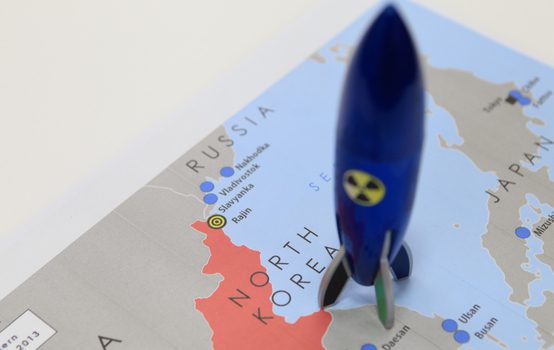North Korea and Trump Administration Dysfunction

Aaron David Miller and Richard Sokolsky comment on how Trump has once again undermined and contradicted his own Secretary of State:
In our combined 50-plus years at the State Department, neither of us ever witnessed as profound a humiliation as a sitting president handed his secretary of state this morning.
“I told Rex Tillerson, our wonderful Secretary of State, that he is wasting his time trying to negotiate with Little Rocket Man,” the president wrote. “Save your energy Rex, we’ll do what has to be done!”
Even if they’re playing good cop/bad cop, this is a shocker: Donald Trump is basically announcing that any negotiations with North Korea are worthless. This not only undercut Tillerson personally, but also undermines U.S. interests and the secretary of state’s sensible decision to talk to the North Korean regime. To make matters worse, all of this is occurring while Tillerson is in Beijing to prepare for the president’s trip to China next month—so the president kneecapped his own top diplomat in front of America’s chief rival in Asia.
Trump has gone out of his way to contradict Tillerson on several different occasions over the last nine months, especially in connection with the Qatar crisis, but this may be the most significant episode yet. The Trump administration has sent conflicting signals on North Korea all year long: the president issues reckless threats of possible military action and his Cabinet officials struggle to clean up the mess by reassuring allies and trying to defuse tensions. Trump talks about “fire and fury” being unleashed on North Korea, and then Tillerson and Mattis pledge that the U.S. has no desire for regime change. Trump talks about “totally destroying” the country, and then Tillerson says that the U.S. is directly communicating with North Korea:
The Trump administration acknowledged on Saturday for the first time that it was in direct communication with the government of North Korea over its missile and nuclear tests, seeking a possible way forward beyond the escalating threats of a military confrontation from both sides.
“We are probing, so stay tuned,” Secretary of State Rex W. Tillerson said, when pressed about how he might begin a conversation with Kim Jong-un, the North Korean leader, that could avert what many government officials fear is a significant chance of open conflict between the two countries.
Everyone would like to believe the more reassuring messages coming from Cabinet officials, but then Trump contradicts them so often in public that it is difficult for anyone to know what U.S. policy really is. That is bound to make North Korea’s leadership even jumpier and more prone to dangerous behavior, and it makes it that much harder for the U.S. and its allies to present a united front when the U.S. government can’t even do that among its own top officials.
The danger here is twofold. Foreign governments will have good reason to doubt that Tillerson has the president’s full backing in any negotiations he may be involved in, and North Korea’s government will assume that any offer to negotiate is meaningless. Trump’s disdain for diplomacy has been evident for a long time, but by sabotaging Tillerson in such a public and blatant way he is closing off whatever diplomatic options may have still been available with North Korea.
That said, Tillerson’s State Department isn’t exactly covering itself in glory on this issue. The State Department spokesperson tweeted this out earlier today:
#DPRK will not obtain a nuclear capability. Whether through diplomacy or force is up to the regime @StateDept
— Heather Nauert (@statedeptspox) October 1, 2017
There is no question that North Korea obtained that capability a long time ago, and it has possessed nuclear weapons for more than a decade now. Those things aren’t going to be undone by diplomacy or by force, except perhaps in the event of a disastrous nuclear war whose costs are unthinkably high. It is absurd to make statements like this, and it reflects the administration’s unwillingness to accept that denuclearization isn’t going to happen here. North Korea’s government has made clear in its public statements and in its “track two” communications with former U.S. officials that denuclearization is not an option they will ever discuss. If our diplomats expect negotiations with North Korea to yield concessions that Pyongyang has already said it will never make, they are setting themselves and the U.S. up for failure.
Tillerson’s remarks this week suggest that he doesn’t understand this:
He insisted that the ultimate goal of the negotiations would be complete denuclearization, a goal many experts believe is foolhardy to attempt, because the North has made clear that its nuclear arsenal is a pillar of the state. That is acknowledged in the North Korean Constitution.
“They can change their Constitution,” Mr. Tillerson said. “Especially the people running North Korea — it’s pretty easy for them to change it.”
Perhaps North Korea’s leadership could make this change, but that would require them to accept that they don’t need a nuclear arsenal for self-preservation. That is something they emphatically do not and will not accept, and they have been completely unambiguous about this. So long as denuclearization remains the goal of U.S. policy, that policy has no chance of success because it requires the other side to give up the one thing they absolutely don’t want to give up.
Comments